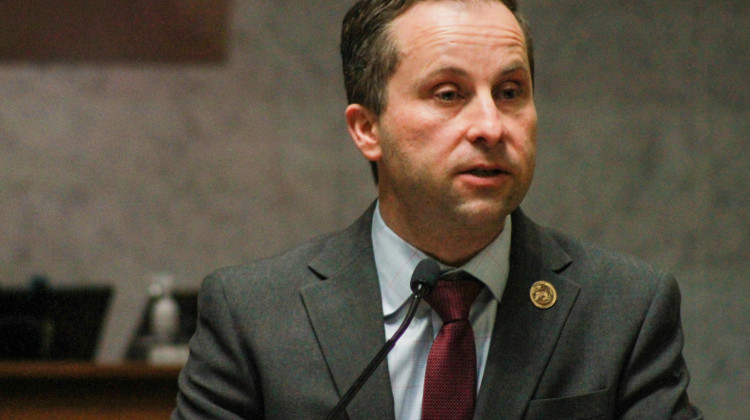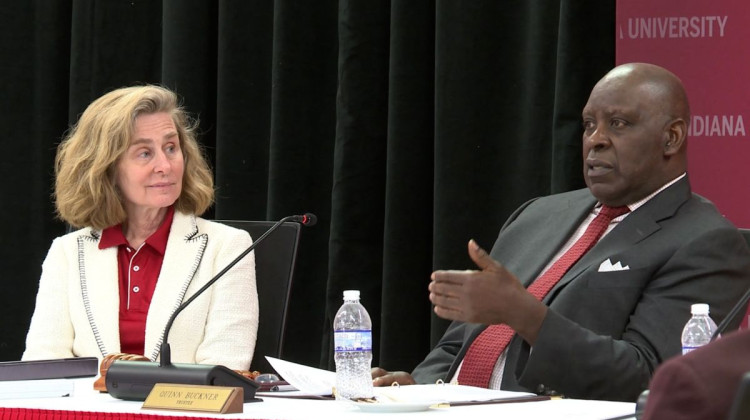
Sen. Spencer Deery (R-West Lafayette), the bill's author, presented SB 255 to the Senate Education and Career Development Committee on Jan. 15.
Brandon Smith / IPB NewsSenate lawmakers are considering a bill that would address teacher shortages in STEM, change the amount of time high school students are allowed to leave school to attend religious instruction, and alter the timeframe of when schools must notify parents of bullying incidents.
The Senate Education and Career Development Committee plans to make any amendments to the bill Wednesday and vote to send it to the full Senate.
STEM teacher licensing
SB 255 would allow individuals with certain types of STEM bachelor’s degrees and some teaching credits to receive an initial practitioner license. Eligible individuals must have at least a 2.5 GPA and a bachelor’s degree in science, technology, engineering or math. They must also have at least nine academic credits in certain teaching courses like lesson planning, instructional activities and formative and summative assessments.
Sen. Spencer Deery (R-West Lafayette), the bill’s author, said the requirements are similar to majoring in STEM and minoring in education. Students would still be required to spend time in a classroom and take a test.
“And then, upon graduation, you are a licensed teacher,” Deery told the Senate Education and Career Development Committee last week.
Deery said Indiana’s STEM educator shortage is critical. For example, he said only 17 licenses have been issued across the state recently for new chemistry teachers. To fill the gaps, the state had to issue a high number of emergency teaching licenses, which don’t require an extensive education background.
“In an era where we need more and more STEM teachers, we aren’t meeting that by any measure,” he said.
He said he is hopeful this bill will encourage more STEM majors to earn teaching credentials on top of their majors.
That portion of the bill received support from the chief academic officer from Purdue University, the Indiana Association of School Principals, a representative from Project Lead the Way, and the Indiana State Teachers Association, among others.
Religious instruction
In additional to STEM teacher licensing, the bill also expands the amount of time high school students are allowed to leave school to attend religious instruction.
Lawmakers passed a measure last year that requires schools to let students leave for religious education for up to 120 minutes per week. This year’s bill would retain that time limit for elementary students, but it would allow high school students to leave for an amount of time equal to one elective course each week.
Deery said the 120-minute cap is disruptive to high school students' schedules because it could require them to miss up to two class periods a week. His bill would give those students the option to replace an elective with off-campus religious instruction instead.
“The bill simply says the cap for high school is the equivalent of an elective course,” he said.
Last year’s bill faced controversy because educators said schools should not be required to let students leave campus for religious instruction. Before that bill became law, schools had the option to say no.
A representative from the Indiana State Teachers Association said ISTA has some questions about the repeal of the 120-minute cap on religious instruction and what that would look like as a daily elective.
Joel Hand, a representative for the American Federation of Teachers Indiana and the Indiana Coalition for Public Education, said both organizations oppose increasing the amount of time students are allowed to leave school for religious instruction.
“Although there‘s a directive in the law that requires the religious institution and the school to collaborate, because the law also mandates that the principal to release the child, we’re hearing from the field that there are situations where elementary school students are missing parts of or all of a reading block on certain days so the student can attend religious instruction,” Hand said.
He pointed to a bill passed into law last year that requires schools to hold back third grade students who fail the state reading test. Hand said expanding religious instruction time could undermine the massive effort undertaken last year to improve Indiana’s literacy rates.
READ MORE: How do I follow Indiana’s legislative session? Here’s your guide to demystify the process
Join the conversation and sign up for our weekly text group: the Indiana Two-Way. Your comments and questions help us find the answers you need on statewide issues, including our project Civically, Indiana and our 2025 bill tracker.
Hand suggested that lawmakers add language into the bill requiring students to be released for religious instruction during the least intrusive part of their school day.
Bullying
The bill also addresses how parents are notified about bullying incidents. Instead of giving schools five days to alert parents to bullying incidents, the measure would require them to make their “best effort” to notify parents of both the targeted student and the alleged perpetrator by the end of the day when a bullying incident is reported.
Deery said this issue is important because students may not tell their parents about bullying incidents, and schools can use the current law to delay informing them.
“As a parent, I deserve to know what the school knows. That they were involved in some kind of incident,” he said. “Maybe I don’t want to leave them alone because I’m worried about self-harm. Maybe I don’t want to send them to school because I’m worried they’re going to be faced with more bullying.”
He said schools are not required to have all the details about an incident right away, but they must at least make parents aware that something happened.
This portion of the bill received widespread support from multiple education officials and parents. Some parents shared their own experiences of being notified about bullying incidents at their children’s school after the fact.
“It is gut-wrenching to learn that your child has been enduring this in a place where they didn’t feel safe while you were completely unaware,” said mother and West Lafayette School Board member Dacia Mumford. “Worse yet, there is the guilt of having pushed them back into this challenging environment without having provided any support at home.”
Mumford said she asked her children's school to enact a policy to inform parents of bullying incidents sooner, but the district chose not to because state law does not require immediate notification.
Kirsten is Indiana Public Broadcasting's education reporter. Contact her at kadair@wfyi.org or follow her on Twitter at @kirsten_adair.
 DONATE
DONATE








 Support WFYI. We can't do it without you.
Support WFYI. We can't do it without you.